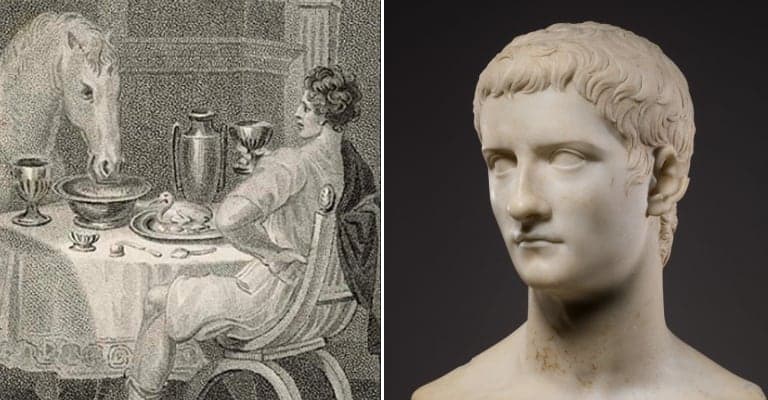In 37 AD, the people of Rome rejoiced when they finally gained a new emperor. The dour, Emperor Tiberius was dead, and it was good riddance as far as the populace was concerned. For Tiberius had instigated a wave of treason trials and executions that had disrupted society. Worse still, he had murdered members of his own family. The new emperor was one of the survivors of this purge. Gaius Julius Caesar Germanicus was just 24 years old. A great-grandson of Augustus, he was also the son of the war hero Germanicus. In the people’s minds, the emperor Gaius as he was known could only mean a return to the good old days.
They were wrong. For within four short years, their “savior’ was dead, murdered by his own guards after a morning at the games. History would remember the emperor Gaius as one of Rome’s worst rulers. It would also remember him by his hated childhood nickname. For Gaius Caesar became “Little Boots” or Caligula. A bloodthirsty megalomaniac, Emperor Caligula was guilty of blasphemy, incest, and state-sanctioned murder, torture, and robbery. However, interspersing the cruelty and sadism were moments of breath-taking ridiculousness- such as the occasion he made his favorite horse a consul. Such actions led the emperor’s contemporaries to question his sanity. So was Caligula bad- or just plain mad?

The Consul Incitatus and Other Batty Moments
The first seven months of Caligula’s reign went well. The new emperor paid Tiberius’s legacies promptly- and wooed the already adoring Roman people with lavish gladiatorial games. He also ruled ‘democratically” consulting the Senate before all decisions and avoiding too many honorific titles. Caligula recalled all exiles, poured money into public works such as a new aqueduct in the Tiber region and passed laws that restored popular control over the magistrates. Then, in October 37 AD, he fell seriously ill. For a time, his life was uncertain, but to the great joy of all, he lived. That joy was short-lived, however, when it became apparent that Caligula was significantly changed.
Certain of the emperor’s behaviors could be regarded as eccentric, if not outright ‘batty.’ For one of the first things Caligula did was to announce his divinity. The Senate had deified Julius Caesar and the emperor Augustus after their deaths. However, it was unprecedented for a living Roman to claim such an honor. Caligula, however, had decided he was one of the most ancient Roman deities, Jupiter Latiaris. He immediately established his own priesthood and a temple- complete with a life-sized golden statue for worshippers to adore.

Caligula’s divinity was mutable. One moment he was roaming the palace as Jupiter, complete with a false golden beard and a thunderbolt. The next, he had armed himself with a trident to become Neptune, or a serpent-entwined staff when he was Mercury. Caligula even donned a woman’s gown and slippers when he became Venus. To reflect his divine omnipresence, the emperor had all the heads of the statues of the gods removed and replaced with his own. When he was not imitating the gods, Caligula subdued them. He reduced the divine twins, Caster and Pollux to the status of doormen when he had their temple incorporated into the Imperial Palace. He even claimed to have blackmailed Capitoline Jupiter into sharing his temple- and to have forced the moon goddess to sleep with him every full moon.
Caligula’s mad behavior was not confined just to religious matters. In 39 AD, he decided to go to war. He attacked the Germans- or rather the trees of their forests. Once he had collected enough branches as booty, he moved onto the coast of Gaul. There, Caligula lined up his soldiers and artillery to face the channel. The emperor’s commanders presumed he intended to invade Britain. Instead, Caligula gave the order ‘gather seashells.’ His troops were then forced to walk the seashore, filling their helmets and tunics with seashells that were presented in chests as “plunder from the ocean.”
However, arguably the craziest stunt Caligula pulled was with his favorite racehorse, Incitatus. Incitatus had his own staff, house, and stable. Guards were posted the night before the horse was racing so that Incitatus could have a good night’s rest. The horse slept in an ivory stall, with purple blankets and wore a jeweled harness. Caligula denied Incitatus nothing. He even organized dinner parties in the horse’s name. However, Caligula managed to top all of this when one day, he assembled the Senate and announced he intended to make Incitatus a consul.

